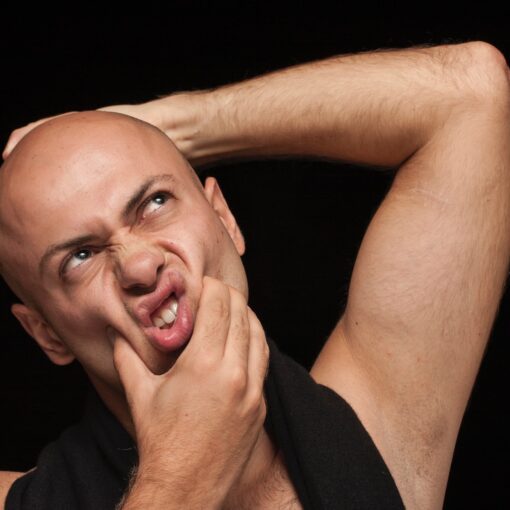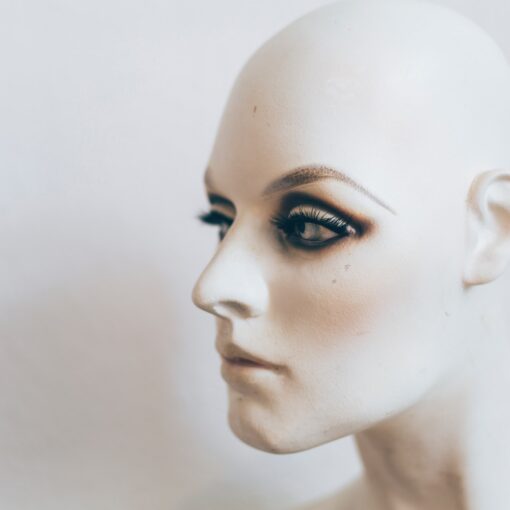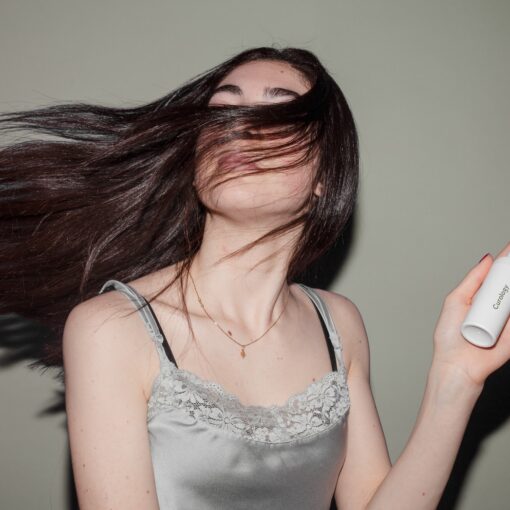Page Menu
Everyone sheds about 100 hairs a day. For those who suffer from excessive hair loss, these hairs may come as a surprise. It is estimated that around 10% of the population will see increased shedding at some point in their lives, and that it can happen to anyone at any age. There are many reasons for hair loss. The most common causes include: hormonal changes during pregnancy or menopause, medications to treat an illness, medical conditions such as thyroid disease, and stress.
Key Concepts and Top Takeaways
– Consult a dermatologist: Get a professional assessment to determine the cause of hair loss.
– Consider dietary changes: Incorporate vitamins and minerals like biotin, iron, and zinc into your diet.
– Use gentle hair care products: Choose sulfate-free shampoos and avoid harsh chemicals.
– Avoid tight hairstyles: Reduce stress on hair follicles by opting for looser styles.
– Manage stress levels: Practice relaxation techniques such as meditation or yoga to minimize stress-related hair loss.
– Stay hydrated: Drink plenty of water to support overall health and hair vitality.
– Limit heat styling: Reduce the use of blow dryers, straighteners, and curling irons to prevent damage.
– Explore topical treatments: Consider minoxidil or other recommended products for stimulating growth.
– Be cautious with supplements: Discuss any new supplements with your doctor before starting them.
– Maintain a healthy lifestyle: Regular exercise and adequate sleep contribute to better hair health.
Please Note: This post may contain affiliate links. If you click one of them, we may receive a commission at no extra cost to you. As an Amazon Associate, I earn from qualifying purchases.

Recent studies show that hair loss is a common problem for both men and women. In fact, one in two men and one in four women will experience significant hair loss by the age of 50. There are many causes of hair loss including genetics, hormonal changes, stress, pregnancy, medications, environmental factors and age. It is important to take control of your own health before it starts negatively impacting other aspects of your life.
Hair loss can be a devastating thing to go through. It is not just physical hair that is lost, but the hair on your head symbolizes who you are as a person. This is one of the most difficult aspects of hair loss for many people. But, there are some ways to manage the problem and prevent more hair loss from occurring. First off, it is important to take care of your scalp.
Hair loss, whether male or female, may have a significant impact on your self-esteem and confidence. Hair loss in men, in particular, is presented negatively in the media, with the implication that a guy is less of a man if he is balding on top. Here are some of the reasons for hair loss and how to cope with them.
Rapid Weight Fluctuations May Cause Hair Loss
Many people experience rapid weight fluctuations, which may cause hair loss. This pattern has been observed more prevalently in women due to changes in hormone levels associated with menstruation and menopause. Rapid weight fluctuations work against the body's ability to grow new hair, while also shedding some existing follicles. The result is often times more noticeable around the periphery or top of the head, where there are fewer hairs.
Losing weight quickly and gaining it back can lead to a number of problems, one of which may be hair loss. Rapidly losing weight can lower your levels of fat, hormone and nutrient stores in the body, which can cause hair loss. A person who loses weight rapidly can also experience hormonal changes that lead to hair thinning or shedding. If you experience rapid weight fluctuations, it's important to talk to your doctor about the potential for hair loss and what you can do if this happens.
Rapid weight fluctuation is a common problem for many people. A recent study found that rapid weight fluctuations may cause hair loss in some individuals. A person's hair function as a mirror to their overall health, so it is important to be aware of the risks associated with weight fluctuations.
Rapid weight fluctuations may cause hair loss since your body has a difficult time adapting to the new size. Make an effort to be as active as possible in order to decrease the amount of fat in your body and position yourself to fight hair loss.
Chlorine And Salt May Damage Your Hair
 For decades, the fashion industry has pushed the idea that chlorine and salt water will damage your hair. Those who swim regularly or use a home pool to cool off during the summer might be familiar with this warning. Chlorine is present in public pools and can penetrate into the hair shafts and lead to dry, brittle hair even when it is not exposed to direct contact with the liquid.
For decades, the fashion industry has pushed the idea that chlorine and salt water will damage your hair. Those who swim regularly or use a home pool to cool off during the summer might be familiar with this warning. Chlorine is present in public pools and can penetrate into the hair shafts and lead to dry, brittle hair even when it is not exposed to direct contact with the liquid.
Many people take chlorine and salt for granted when it comes to their hair, but it is important to be aware of the potential negative effects these elements can have on your hair. Chlorine, in the form of tap water, can make hair appear dry, dull, and brittle. Even when you are not swimming in a pool or ocean, chlorine gets into your hair through sweat or regular showering because it is everywhere.
Chlorine and salt are well-known for their damaging effects on hair, but many people do not know the underlying reasons. Chlorine, for example, can cause dryness, breakage, split ends and color-fading. Salt water is usually better than chlorinated water because it does not contain all the chemical ingredients that can damage hair.
Wash your hair with the appropriate shampoo for your hair type. Determine if your hair is oily, dry, or normal, and whether you need dandruff shampoo. Wash your hair two to three times each week, more if you swim in seawater or pools with chlorine, since chlorine and salt may damage the follicle. Always carefully rinse to eliminate any shampoo residues that may block follicles.
Vitamin D Combats Symptoms Of Hair Loss
 Vitamin D is an essential vitamin that the body needs to synthesize hormones, maintain bones and teeth, and fight infections. Studies have found that low levels of vitamin D are linked to hair loss in men and women. The one-two punch of Seasonal Affective Disorder (SAD) and low levels of vitamin D can cause hair loss.
Vitamin D is an essential vitamin that the body needs to synthesize hormones, maintain bones and teeth, and fight infections. Studies have found that low levels of vitamin D are linked to hair loss in men and women. The one-two punch of Seasonal Affective Disorder (SAD) and low levels of vitamin D can cause hair loss.
Research suggests that people with seasonal affective disorder have lower vitamin D levels.
Vitamin D is a vitamin that the body produces when it is exposed to sunlight, and is essential for maintaining healthy bones, muscle control, and skin. It has been found that vitamin D may also help with hair loss.
Many people have found that a deficiency of vitamin D can contribute to hair loss. A study conducted by the University of Maryland Medical Center found that among women with the highest levels of vitamin D, only eleven percent had moderate or severe hair loss, whereas among those with the lowest level of vitamin D, fifty-three percent had moderate or severe hair loss.
Vitamin E is an excellent addition to your arsenal for combating the symptoms of hair loss. This vitamin can be used as an oil to hydrate your scalp and strengthen your hair. You may also take this vitamin as a tablet to decrease brittle hair that is prone to falling out.
Avoid Worrying About Your Thinning Hair
 Walking around with thinning hair can be difficult. This article offers suggestions for how to avoid worrying about your hair by doing things like working with what you have, wearing hats, and spending less time in the wind or sun.
Walking around with thinning hair can be difficult. This article offers suggestions for how to avoid worrying about your hair by doing things like working with what you have, wearing hats, and spending less time in the wind or sun.
When you start to notice that your hair is thinning, it's not just about looking in the mirror and feeling less than perfect. Hair loss can lead to low self-esteem, depression, anxiety, and even suicidal thoughts. The following are 6 ways you can stop worrying about your hair loss.
-Keep your hairstyle simple so that there's less hair to cover up.
There are many reasons why people may not like their thinning hair. A lot of people associate the loss of volume with old age, and it usually doesn't bother them until they hit their twenties or thirties. It's important to remember that there are different reasons for this type of hair loss, and some can be easily rectified.
One possible reason for the thinning hair is too much stress on the scalp.
Avoid worrying about your thinning hair. It is normal to lose hair as you age, but some people lose hair sooner than others. When you obsess about something all the time, it causes tension and worry, which may exacerbate the problem. To maintain your hair healthy, shampoo, condition, and brush it as usual, but step away from the mirror and keep your hands out of your hair.
Consuming Fruits Is Important For Hair Health
 It is important to consume fruits due to their numerous health benefits, especially for hair health. Fruits are rich in vitamin A and an antioxidant called lycopene, which is excellent for the skin, including the scalp. Lycopene also reduces the risk of developing cancerous cells in the head's lymph nodes. Other crucial nutrients found in fruit that are beneficial for hair health include vitamin C, potassium, biotin, and calcium (among others).
It is important to consume fruits due to their numerous health benefits, especially for hair health. Fruits are rich in vitamin A and an antioxidant called lycopene, which is excellent for the skin, including the scalp. Lycopene also reduces the risk of developing cancerous cells in the head's lymph nodes. Other crucial nutrients found in fruit that are beneficial for hair health include vitamin C, potassium, biotin, and calcium (among others).
Did you know that consuming fruits can actually help with hair health? The vitamins and nutrients found in fruit are essential for hair health, as they are the building blocks of our body. Fruits provide antioxidants that fight against free radicals to keep us healthy. They are also rich in Omega 3s, which are important to cell growth, mental clarity, and various other factors that play into hair health. It is important to consume at least 5 servings of fruit a day for optimal health.
Everyone knows that a healthy diet consisting of fruits and vegetables is important in order to maintain a healthy lifestyle. Fruits provide your body with numerous vitamins that are important for maintaining a healthy system. One of the most notable benefits of eating fruits is the prevention of hair loss. Fruits contain many minerals and compounds that help keep your scalp healthy, which in turn can help reduce hair loss.
Fruits are the most important things you can consume in your body for your hair. Fruits are high in useful nutrients and may be consumed at any time of day or night. Consume fruit to get a high dosage of vitamin C, which aids in the production of collagen for your hair.
Be Careful When Using Minoxidil Treatments
Minoxidil has been shown to be an effective treatment for hair loss, specifically androgenetic alopecia, but there are some important things you should know before you start. Minoxidil is administered orally as a liquid, foam, or cream. For the best results, it is recommended that you apply it twice per day to the balding area on your scalp.
A recent study shows that more than one in ten people who use Minoxidil as a skin treatment for baldness report some form of adverse reaction to the treatment. This is a more frequent occurrence among those with darker skin types. In these cases, side effects can include itching, redness, swelling, and blistering of the scalp. The study also finds a higher incidence of hair loss and a lower rate of hair growth in participants who have darker skin types.
Minoxidil is a topical medication prescribed in order to treat male pattern baldness, but it can also be used as a treatment for hair loss due to other causes. It works by attacking the root of the problem at its source, stimulating new blood vessels that provide oxygen and nutrients to the follicles. This process stimulates dormant follicles into new life.
When taking a minoxidil treatment like Rogaine, be sure to use enough of conditioner when washing your hair to keep your scalp from getting dry. You must maintain your scalp hydrated at all times. Excessively dry skin on your scalp may reduce the efficacy of a product you're taking or utilizing.
Altering Your Diet Can Help To Halt Hair Loss
 Many people are looking for ways to make their hair healthier. For some, this may be as simple as switching to a shampoo without sulfates, or it could be as drastic as changing your diet. We all know that what we eat can have an impact on our health, but what about our hair? Many people are turning to veganism for its ability to help with hair loss. Veganism is the practice of abstaining from consuming any animal products whatsoever.
Many people are looking for ways to make their hair healthier. For some, this may be as simple as switching to a shampoo without sulfates, or it could be as drastic as changing your diet. We all know that what we eat can have an impact on our health, but what about our hair? Many people are turning to veganism for its ability to help with hair loss. Veganism is the practice of abstaining from consuming any animal products whatsoever.
Hair loss can be a normal part of life, but for some people it can be devastating. The hair loss condition that affects the most people is alopecia areata, where hair turns into a band or patchy bald spots indefinitely. Medically, there is no cure for this condition and treatment is mainly focused on managing the symptoms.
Many daily dietary changes can help to halt hair loss. Cleaning up what you're eating can sometimes stop the problem before it even starts. From eating more protein-rich foods like eggs, fish and nuts to including more iron-rich foods like spinach, beans, lentils and beef, there are many healthy food swaps that can help you fight the battle of the ‘do.
If you want to help halt hair loss, you should alter your diet. Protein-rich meals such as eggs, salmon, soy milk, and other protein-rich foods can undoubtedly assist to strengthen your hair and prevent future loss. A change in diet is important for maintaining the health of your hair.
Massaging Your Scalp On A Regular Basis Is Good For Your Hair
 It has been proven that regular scalp massage can improve circulation, reduce stress, improve natural oil production, and stimulate hair growth. Massaging your scalp on a regular basis is good for your hair because it can benefit many things, including blood flow. Blood carries oxygen to the skin surface and also carries away toxins which may contribute to skin conditions. Regular scalp massage helps cultivate healthy oils, which are necessary for better hair growth. Massaging your scalp on a regular basis is good for your hair!
It has been proven that regular scalp massage can improve circulation, reduce stress, improve natural oil production, and stimulate hair growth. Massaging your scalp on a regular basis is good for your hair because it can benefit many things, including blood flow. Blood carries oxygen to the skin surface and also carries away toxins which may contribute to skin conditions. Regular scalp massage helps cultivate healthy oils, which are necessary for better hair growth. Massaging your scalp on a regular basis is good for your hair!
A lot of people believe that shampooing their hair is all they need to do to keep it clean. However, this article points out that you should massage your scalp on a regular basis as well. This will stimulate the circulation in your scalp and promote hair growth.
Massaging your scalp promotes hair growth because it stimulates the circulation in your scalp. This helps keep follicles healthy and prevents any potential damage to your hair.
Many people believe that hair loss is inevitable as we age. However, this belief couldn't be farther from the truth. With proper care and maintenance, your hair can look youthful and healthy for many years to come. One of the most important components in any hair care regimen is massaging your scalp for between 3-5 minutes on a daily basis.
Massaging your scalp on a regular basis is one effective technique for reducing hair loss. Massaging the scalp promotes blood circulation to the hair follicles and assists in the delivery of nutrients to the scalp. Place both hands on your head and stroke your fingers gently in a circular manner to massage your scalp.
Rosemary And Sage Can Help With Hair Loss
 There are many reasons for hair loss, from genetics to stress. Some people choose to get a medical treatment for their hair loss, while others use herbs and remedies to help their hair grow back. In this article, we will explore the benefits of using rosemary and sage to treat thinning hair or bald spots.
There are many reasons for hair loss, from genetics to stress. Some people choose to get a medical treatment for their hair loss, while others use herbs and remedies to help their hair grow back. In this article, we will explore the benefits of using rosemary and sage to treat thinning hair or bald spots.
Hair loss is typically due to genetics, over styling, or overuse of chemical products. But there are other causes that can be addressed. The use of common cooking herbs like rosemary and sage can help with hair loss by strengthening your scalp and promoting growth.
Hair loss is a natural process that many people experience. Fortunately, there are many treatments available to help slow down this condition and even reverse it. The oils from rosemary and sage can be used in an aromatherapy treatment to stimulate the scalp and promote hair growth. These oils can also be massaged into the roots of hair to promote healthy hair follicles.
Rosemary and sage are two herbs that may help with hair loss. These natural herbs thicken hair, preventing it from falling out. To effectively utilize this technique, first boil the rosemary and sage in water. The herbs should then be strained and used on a regular basis to observe effects.
Try To Be More Gentle With Your Hair When It Is Wet
 One of the most common causes for damage to hair is how it is washed. It is imperative that you be gentle with your hair when washing it. The more you can avoid rough shampoos, rough scrubbing, and rough combing the better. Gentle shampooing should be done by first wetting the hair thoroughly. You should then apply the shampoo to your scalp and work it lightly into your scalp for a few minutes before lathering up.
One of the most common causes for damage to hair is how it is washed. It is imperative that you be gentle with your hair when washing it. The more you can avoid rough shampoos, rough scrubbing, and rough combing the better. Gentle shampooing should be done by first wetting the hair thoroughly. You should then apply the shampoo to your scalp and work it lightly into your scalp for a few minutes before lathering up.
Wet hair is vulnerable to breakage and damage. Along with air drying, there are many ways to help protect the health of your hair when it is wet. You can use a comb or brush that has very narrow teeth and be gentle and patient as you work through tangles. Try not to yank on knots, and instead try pulling slowly on them, working from one end of the knot to the other until it's released.
It's no secret that wet hair is less manageable than dry hair. The first time your fingers tangle themselves on a wet strand, you will know that it can be difficult to style wet hair. What some may not know is that the struggle of styling wet hair is on par with fighting with a towel when it's wrapped around an object. It sucks the life out of your arm muscles, and it takes patience for one to get out of the house looking decent.
Are you losing hair on a daily basis? Are you concerned that your hair loss may progress to bald patches in the near future? One thing you can do to reduce hair loss is to be gentler with your hair while it's damp. While your hair is damp, avoid hard brushing or combing. When hair is damp, the roots are extremely fragile and prone to breaking.
Avoiding Stress Can Help With Hair Loss
 The physical and emotional stress that we experience in our daily lives can take a toll on our hair.
The physical and emotional stress that we experience in our daily lives can take a toll on our hair.
Stress can lead to hair loss when it causes an increase in testosterone levels or disrupts the normal functions of the immune system.
Unfortunately, our natural ability to produce hair decreases as we age, so this type of stress is more likely to affect people who are over 40 years old.
It can be difficult to find solutions to hair loss. Stress is one of the major factors related to hair loss. As your body goes through stress, it releases hormones that can cause hair loss. When you manage your stress, you may be able to prevent or limit the amount of hair you lose. The following are some ways you can reduce stress and help with hair growth:
1) Exercise for at least 30 minutes every day.
2) Take deep breaths throughout the day.
Some people may experience hair loss as a symptom of stress, and others may experience hair loss as a result of genetics. Stress is an extremely common cause of hair loss because it increases the amount of cortisol in our bodies. When we feel threatened or stressed, we release the hormone cortisol, which tells the body to prepare for “fight or flight” and can stop hair growth.
Make an effort to avoid being worried. Stress may cause hair loss and premature graying. You may prevent stress by using techniques such as meditation or yoga. This can help you retain your hair and avoid further hair loss by lowering your stress levels.
Hair Loss Can Be Tied To Hormone Levels
Stress affects people in many ways. One of the most visible effects is hair loss. When you are under stress, your body produces an adrenal hormone called cortisol that directly attacks your hair follicles. This can cause your hair to thin out and stop growing, leading to bald patches in sensitive areas like the back of the head or crowning. There are steps you can take to avoid or minimize these effects by reducing stress levels.
I would like to talk about stress and hair loss, and how they are related. Stress is a common cause of hair loss. When we experience stress, our bodies release the hormone cortisol, which can lead to hair loss. We also experience less blood flow to the scalp, which can cause more hair follicles to enter a dormant phase and stop producing hairs altogether.
Hair loss is a common concern for many people as they age, or as they go through stressful times. The same can be true for those who have been undergoing chemotherapy or radiation therapy. This article will give tips on how to minimize stress and reduce hair loss.
Do not be disheartened if you have hair loss soon after giving birth to your kid. This disease is most likely caused by a shift in your hormone levels, therefore there is no need to be concerned. When your hormone levels return to normal after your pregnancy, your hair growth should return to normal.
Getting Enough Sleep Can Help Stop Hair Loss
 Many people struggle with hair loss for different reasons, but getting a sufficient amount of sleep might be the solution. Studies show that not getting enough sleep can disrupt the normal cycle of hair production and break down your scalp’s ability to produce the necessary vitamins needed to maintain healthy hair. A scientist at Brigham and Women’s Hospital in Boston found that women who slept for less than 6 hours per night had 70% more hair breakage than those who slept for 8 hours or more.
Many people struggle with hair loss for different reasons, but getting a sufficient amount of sleep might be the solution. Studies show that not getting enough sleep can disrupt the normal cycle of hair production and break down your scalp’s ability to produce the necessary vitamins needed to maintain healthy hair. A scientist at Brigham and Women’s Hospital in Boston found that women who slept for less than 6 hours per night had 70% more hair breakage than those who slept for 8 hours or more.
Hair loss can be a devastating condition for both men and women. It is not uncommon for someone to lose a significant amount of hair each day. The average human head sheds between 100 and 150 hairs every day, according to MedlinePlus. This process is known as “hair cycling”.
For many people, hair loss can be a distressing issue. It's also quite common for people to try to cover up the issue by using make-up or wearing hats. However, hair loss can often stem from other factors, such as an illness or hormone imbalance. Getting enough sleep is one of the best ways to ensure you are healthy and happy.
Get enough sleep to keep your hair from falling out. Getting adequate sleep is essential since it rejuvenates and strengthens your body and hair. It also eliminates toxins from your body, making your hair healthier and less prone to falling out. It is advised that you obtain at least 8 hours of sleep each night.
While there are many products available to help with receding hairlines, there is no assurance that they will be effective. The first obstacle to overcome is mentally coping with the circumstance and learning how to live with it. However, with time and patience, you can ensure that hair loss does not take over your life.

Kevin Collier is a seasoned health writer at Otchut.com, specializing in over-the-counter medicines, common medical ailments, and general health topics. With a background in healthcare and a passion for making medical information accessible, Kevin aims to empower readers with knowledge to make informed health decisions. When he's not writing, he enjoys researching the latest in health trends and advocating for wellness in his community.






